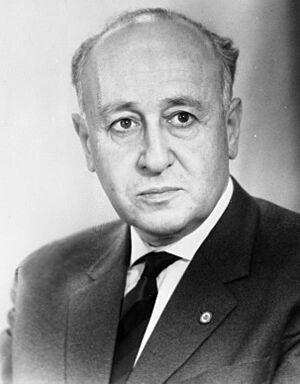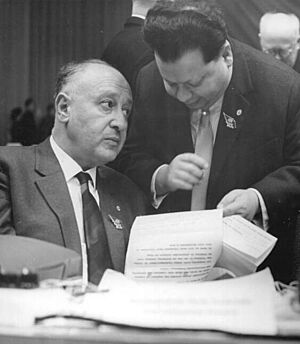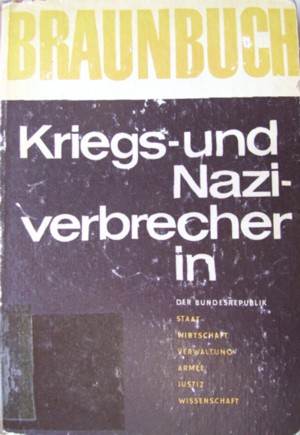Albert Norden facts for kids
Quick facts for kids
Albert Norden
|
|
|---|---|

Norden in 1963
|
|
| Secretary for Friendly Parties of the Central Committee Secretariat |
|
| In office 1971 – January 1979 |
|
| General Secretary | |
| Preceded by | Hermann Matern |
| Succeeded by | Joachim Herrmann |
| Secretary for Foreign Information of the Central Committee Secretariat |
|
| In office März 1955 – January 1979 |
|
| General Secretary | |
| Preceded by | Hermann Axen |
| Succeeded by | Hermann Axen |
| Secretary for Agitation of the Central Committee Secretariat |
|
| In office März 1955 – 22 April 1967 |
|
| First Secretary | |
| Preceded by | Hermann Axen |
| Succeeded by | Werner Lamberz |
| Personal details | |
| Born |
Albert Norden
4 December 1904 Myslowitz, Province of Silesia, Kingdom of Prussia, German Empire (now Mysłowice, Poland) |
| Died | 30 May 1982 (aged 77) East Berlin, East Germany |
| Resting place | Memorial of the Socialists, Friedrichsfelde Central Cemetery |
| Political party | Socialist Unity Party (1946–1982) |
| Other political affiliations |
Communist Party of Germany (1920–1946) |
| Occupation |
|
|
Central institution membership
1958–1981: Full member,
Politburo of the Central Committee 1955–1981: Full member, Central Committee Other offices held
1976–1981: Member, State Council
1960–1979: Member, National Defence Council 1960–1979: Head, West Commission at the Politburo 1955–1967: Head, Agitation Commission at the Politburo 1949–1950; 1958–1981: Member, Volkskammer 1949: Member, German People's Congress |
|
Albert Norden (born December 4, 1904 – died May 30, 1982) was a German politician. He was a leading member of the Socialist Unity Party of Germany (SED) in East Germany. He played a big role in shaping how East Germany presented itself to the world.
Contents
Early Life and Communist Beginnings
Albert Norden was born in Myslowitz, a town in Silesia, on December 4, 1904. His father was a rabbi.
When he was 15, in 1919, Albert Norden joined the Young Communist League of Germany. The very next year, he became a member of the Communist Party of Germany. He started working as an editor for different communist newspapers in 1923. From 1931 to 1933, he was the editor of Rote Fahne, which means 'Red Flag'.
Life in Exile During World War II
In 1933, Albert Norden had to leave Germany. This was because the Nazis came to power. He lived in different countries, including France, Denmark, and Czechoslovakia. He returned to France in 1938.
He was held in France from 1939 to 1940. In 1941, he managed to move to the United States. Sadly, his father died during World War II. While living in Paris and New York, Norden worked on various publications that supported a "popular front" against fascism. He helped write parts of a famous book from 1933 called Braunbuch über Reichstagsbrand und Hitlerterror. This book talked about how the German Nazi Party was connected to groups in other countries. In 1940, he got married, and his son, Johnny, was born in 1942. In October 1946, he returned to Berlin. There, he became the editor of a weekly newspaper called Deutschlands Stimme ('Voice of Germany').
Political Career in East Germany
After the war, Albert Norden became an important figure in the new country of East Germany. In 1949, he was put in charge of the Press Section for the government's Information Department.
In 1954, he became the director of the National Council of the National Front for a Democratic Germany. He also led the Committee for German Unity. In 1955, he joined the Central Committee of the Socialist Unity Party of Germany (SED). This was the main political party in East Germany. He was also chosen as one of the secretaries of the Central Committee. In 1958, he became a member of the Politburo. The Politburo was the most powerful group in the party.
Norden was in charge of the Agitation Committee of the Politburo from 1955 to 1967. He also led the Information & Foreign Department of the Politburo until 1979. From 1958, he was a member of the Volkskammer. This was the parliament, or main law-making body, of East Germany. In 1960, he became the head of the 'West Commission'. This group focused on relations with West Germany.
In 1963, Norden joined the National Defense Council, a group that dealt with military and security matters. He stayed in this role until 1979. In 1976, he became a member of the State Council. This was a high-level government body. In April 1981, because of his health, Norden left the Central Committee and Politburo. He also left his positions in the Volkskammer and State Council that same year.
The "Brown Book"
After World War II, Albert Norden wrote and spoke a lot about how he believed there were still connections between the old Nazi government and the new government in West Germany.
In 1965, the National Front published a book by Norden called Braunbuch, which means 'Brown Book'. In this book, he claimed that over 1,900 politicians and officials in West Germany had worked for the Nazi regime in the past. This book became very important for people in West Germany who were starting to question the official stories about the Nazi period.
Religious Background
Albert Norden was born into a Jewish family. His father was a rabbi. However, as an adult, Norden chose not to identify himself as Jewish. Still, he was one of the most well-known people of Jewish background in East German society.



